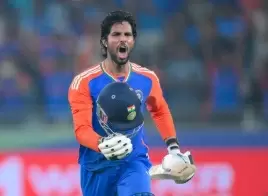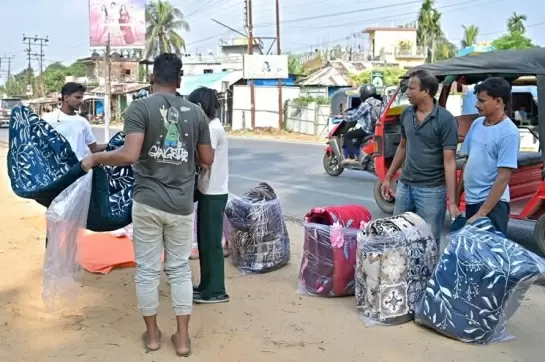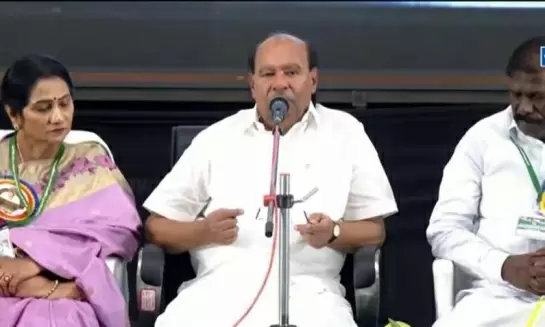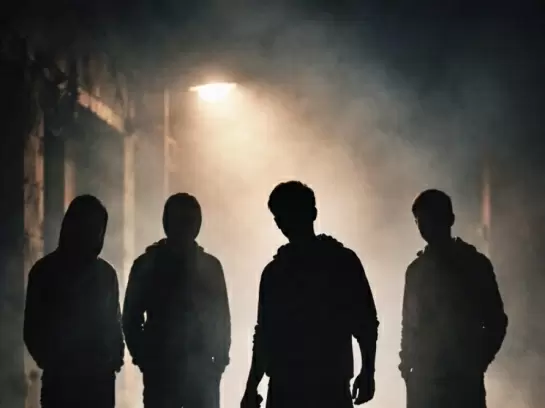How to crack the Civil Services exam: Expert trainer explains
15-November-2019
Vol 10 | Issue 46
There could be none other than Dr. P Kanagaraj who is better equipped to give tips on cracking the civil services examination, popularly known as IAS examination. For the man from Tamil Nadu went all the way to Delhi 30 years ago to prepare for the examination with the sole aim of becoming an IAS officer and serving the nation. When he failed to make it, he turned his misfortune on its head by starting a free coaching programme in Coimbatore and serving the nation in a different way.
Of the 400 persons trained by Kanagaraj, an associate professor in Government Arts College, Coimbatore, since 2007, 88 have cleared the examination.
 |
|
Dr P Kanagaraj, popularly known as the 'Free IAS Coach' shares tips on cracking the civil services exam (Photo: Raghu)
|
“I could not become an IAS officer, but I have the knowledge. So, I decided to serve society by sharing my knowledge with youngsters of the country," he says.
The following FAQs on the civil services exam has been culled out from a conversation Dr Kanagaraj had with P C Vinoj Kumar, Founder Editor of The Weekend Leader, after being conferred with The Weekend Leader Inspiring Indian award at a function in VIT Chennai, and his subsequent interaction with members of the audience comprising students and faculty members of VIT Business School and VIT School of Law.
What is the Civil Services examination?
The examination is conducted annually by the Union Public Service Commission (UPSC) for recruiting officers to around 24 services in the Central Government, including the Indian Administrative Service (IAS), Indian Police Service (IPS), Indian Foreign Service (IFS) and Indian Revenue Service (IRS)
What is the educational qualification for candidates?
The basic educational qualification is graduation. Any degree - B.A., B Sc., B Com., B Tech, MBBS – recognised by the Government of India. Even degrees given by foreign universities are eligible. Even those who have obtained their degrees through correspondence course can apply.
What is the age limit?
The minimum age is 21 for all candidates. The upper age limit depends on the category of the candidates. For general category it is 32 years, for Other Backward Castes it is 35, for Scheduled Castes and Scheduled Tribes it is 37.
How many attempts are allowed?
General category students can appear for the examination six times, while OBC candidates are allowed nine attempts. SC and ST candidates have no such limit in the number of attempts, so it is possible to appear 16 times taking into account the 37 years age limit.
How is the examination conducted?
It is a three stage exam. The first stage is known as Preliminary Exam, second is Main Exam and the third stage is Personality Test. Around eight lakh candidates appear for the Preliminary Exam, whose purpose is to filter out the non-serious ones and pick around 15,000 candidates worthy of sitting for the Main Exam. From the Mains, certain number of candidates will qualify for the interview.
When are the examinations conducted?
Normally, the notification will be issued in December-January calling for applications and the Prelims would be conducted in the month of June or July. The results will be announced in 40 days and the Mains will be in October-November. Roughly after two and a half months results will be announced and the interview is usually held in April-May. The final results are declared three or four days after the last interview is held, which is around end of May. However, there is no rigid schedule and in the last 10 years, there's been tremendous change in the pattern of the exam and in the schedules.
What to know about the Preliminary Exam?
Preliminary Exam is a qualifying paper; an objective type exam, with multiple choices. There are two papers each carrying 200 marks. One is the general studies; the other is the aptitude test (the Civil Services Aptitude Test- CSAT). Candidates must score 33 per cent in CSAT to go to the next stage. Each question would have four choices to choose from. The right answer should be clearly marked on the OMR sheet. The answers will be very, very close and narrow. For example, if the question is ‘which city is nearest to Chennai?’ the choices will be like ‘Arakkonam, Chengalpattu, Gudur and Villupuram’ and not like ‘London, Moscow, New Delhi and Bengaluru.’
How to prepare for the Mains?
Around 12,000 to 15,000 candidates usually qualify for the Mains. There are nine papers – two language papers (both 300 marks each), four general studies papers, one essay paper (250 marks) and two papers on the optional subject.
The first paper is general English and second paper is a modern Indian language. For the essay paper, candidates will be asked to write two essays and the topics given could be like ‘the changing relationship between the modern doctor and his patient’ or ‘men have failed; let women take over.’ The candidate will require voracious reading to write the essays.
Should the language paper chosen be the mother tongue of the candidate?
No, one can choose the language one is comfortable with. But it should be an Indian language.
For the subject papers should one necessarily choose the subject studied in college?
No, not necessarily. Normally candidates are recommended to choose social sciences as the subject. But if they are confident of having adequate knowledge in the subject they specialised in college, they can go with it also.
What about the syllabus for the papers?
UPSC has deliberately framed a syllabus that is very comprehensive because as administrators, the successful candidates will be working in various departments. Say as Secretary for Higher Education one day and in Rural Development the next day and in department of Science the next day and Technology the day after. As they say now, not just everything under the sun is part of the syllabus but even what is inside and outside the sun!
Should the examination be taken only in English?
Candidates are allowed to write in many Indian languages now. (However, the questions are still set only in Hindi and English.) Earlier, the exams were conducted only in English and Hindi. But in 1960s, political leaders and people in Tamil Nadu demanded that students should be allowed to write the examination in Tamil also. The then President of All India Congress Committee, the late K Kamaraj, took up the matter with the Prime Minister, which led to the UPSC ushering in changes in the medium of writing the examination. It said students can write the exam not only in Hindi and English but also in any of the Indian language recognised as a national language in the eighth Schedule (H) of the Constitution.
Is command over English a must?
Yes. English is important because India is a polyglot nation and administrators would be interacting with different people speaking various languages besides making legislation and framing policies. So, it is a must to have knowledge of English. Also the UPSC syllabus is always updated. What happened yesterday will become part of the syllabus today. Since most of the material, most of the events, most of the study materials will be available only in English, it is imperative to have proper working knowledge in English.
How do you prepare for the interview?
Total marks for interview is only 275, which together with the marks in the main examination add up to 2025. Still the interview marks can be decisive. It will not be a conventional interview, in which questions are asked and answers given. It will be a conversation aimed at figuring out the personality of the candidate and to see if the person would be suitable for a career in the civil services. The interview panel would seek to know the biography of the candidate, their character, their background, their place of origin, education and so on,
Once a candidate was asked: ‘If you are the Collector of a district and have two subordinates, one very competent but morally not good and the other incompetent but of impeccable character. If you have to choose between them, who would you go for?’ The candidate answered that he would go for the less competent person because moral turpitude cannot be condoned. His reply was appreciated by the panel.
Another time, the chairperson of the interview panel, a top ranking woman diplomat, suddenly pulled out a pack of cigarettes and started smoking. When she offered a cigarette to the candidate, who had confessed that he is a smoker, he declined saying, ‘Ma’am, sorry my brand is different.’
Yet another candidate was asked by the chairperson of the panel, ‘suppose you get into IAS now and I want to give my daughter to you in marriage, how much dowry would you expect from me?’ The candidate replied, ‘Sir, it is a very personal thing. At the end of the interview, I will wait for you in the canteen, where we shall discuss the modalities.’
Both candidates scored high marks in the interview and cleared the examinations. So, presence of mind is important while facing the civil services interview panel. If the candidate does not know the answer for a question, it is better to say ‘I don’t know’ rather than trying to cover up the ignorance with bombast. Also candidates should not show any sign of disappointment if they felt that they were not faring up to the mark because confidence is important for a bureaucrat to function.
What if the candidate fails to clear the civil services after all the efforts?
If one does not make it - after all there are only just about thousand posts and lakhs of youngsters take the examination – the knowledge that one would have gained preparing for the exam is enough to make one a leader and an achiever in any walk of life. To put it otherwise, the effort does not go waste.
You can become an entrepreneur, you can become a political leader, you can become a social activist, you can become an academician and you can become a great media person.
How does one prepare for the civil services while studying or working?
Time management is very important in the preparations, so if a candidate is a student in a college or works for an organisation, the trick lies in finding at least six hours in between the various other engagements. Of course many people devote their entire day to prepare for the exams but there have been candidates who cleared it while working also.
However while balancing time and efforts between work or study and preparation for the examination, one might run the risk of getting demotivated. So reading motivational books, inspiring success stories, self-help books could enable candidates to tide over bouts of demotivation.
Also to keep one motivated, cultivating a good hobby, and to remain intellectually stimulating, socially useful, environmentally conscious, is very important. Having a hobby or interest in sports can even help in the interview because the panel always judges a candidate by asking questions on their hobbies and favourite sports.
What are the general traits that an aspirant should have?
Patience, hard work, inquisitiveness, reading, an urge to develop the knowledge base, consistency, determination, confidence, a burning ambition to reach the top and of course a social commitment to serve the people of the country.
What are the services to which successful candidates are assigned?
The services can be broadly divided into three: One is the All India Services that is Indian Administrative Service (IAS) and Indian Police Service (IPS). Officers for these services are recruited by the Central Government but deployed in the states. The second kind of services are ‘Central Group A Services’, under which comes around 16 services like the Indian Foreign Service (IFS) Indian Revenue Service (IRS) whose officers work for Income Tax, Customs and Excise departments and the Indian Audit and Account Service (IAAS) and so on. In the third kind, called as Group B Services, there are four or five that include Pondicherry Police Service, Delhi Police Service and so on. Group B officers will be automatically promoted to Group A after eight to 10 years.
Note: Following is the complete list of UPSC services:
All India Services
· Indian Administrative Service (IAS)
· Indian Police Service(IPS)
Central Services (Group A)
· Indian Foreign Service (IFS)
· Indian P&T Accounts and Finance Service (IP&TAFS)
· Indian Audit and Accounts Service (IA&AS)
· Indian Civil Accounts Service (ICAS)
· Indian Corporate Law Service (ICLS)
· Indian Defence Accounts Service (IDAS)
· Indian Defence Estates Service (IDES)
· Indian Information Service (IIS)
· Indian Ordnance Factories Service (IOFS)
· Indian Postal Service (IPoS)
· Indian Railway Accounts Service (IRAS)
· Indian Railway Personnel Service (IRPS)
· Indian Railway Traffic Service (IRTS)
· Indian Revenue Service (IRS-IT)
· Indian Revenue Service (IRS-C&CE)
· Indian Trade Service (ITrS)
· Railway Protection Force (RPF)
Group B Services
· Armed Forces Headquarters Civil Services (AFHCS)
· Delhi, Andaman and Nicobar Islands Civil Service (DANICS)
· Delhi, Andaman and Nicobar Islands Police Service (DANIPS)
· Pondicherry Civil Service (PCS)
· Pondicherry Police Service (PPS)















